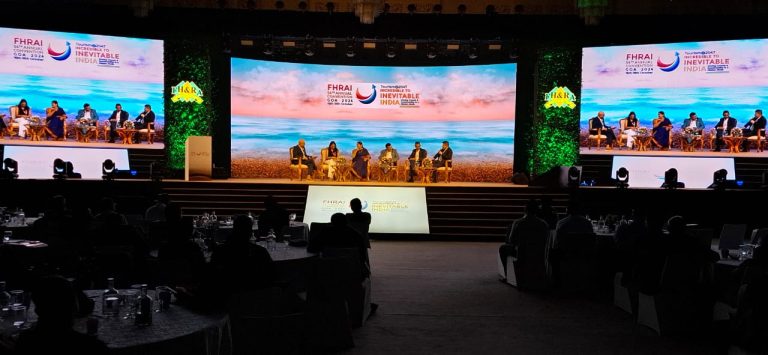On the second day of the Federation of Hotel & Restaurant Associations of India’s (FHRAI) annual convention brought together hoteliers, restaurateurs, and experts to explore topics ranging from sustainability to new-age restaurant trends, aimed at improving business operations and growth in the Indian hospitality industry.
During the event, Honourable Minister for Road Transport & Highways, Nitin Gadkari, shared his thoughts via a message. He expressed his strong support for the hospitality sector, stating, “This is an important event organised by the Federation of Hotels and Restaurant Association of India. The hospitality sector provides the most employment opportunities and is crucial to our economy. Our country is focusing on developing religious and tourist destinations to boost tourism and create more jobs. Additionally, infrastructure projects like new expressways and facilities at tourist sites are helping boost tourism, which in turn creates more jobs. We are developing 18 more tourist destinations, with many projects nearing completion, which will further enhance tourism. Nowadays, people are visiting not only pilgrimage sites but also modern cities and exclusive tourist locations”
The second day of the FHRAI convention featured several insightful sessions focused on key trends shaping the hospitality industry. Mr. Manav Thadani, Founder Chairman of Hotelivate, provided an overview of the industry’s post-pandemic recovery, emphasising the evolving needs of consumers. Mr. Chander Baljee, CMD of Royal Orchid Hotels, discussed the future of hospitality, highlighting the need for businesses to stay agile and embrace digitalization to remain competitive. Sustainability was a major theme, with a panel led by Gurmit Singh Arora discussed regenerative practices that balance guest satisfaction, environmental responsibility, and profitability, featuring insights from experts at ITC Hotels and Accacia.
Mugdha Sinha, Director General of Tourism by the Ministry of Tourism said, “We must rethink our approach to attracting international wedding tourism by offering a seamless experience for foreign guests. Direct flight connectivity, simplified visa processes, and curated, unique itineraries will make India the ultimate wedding destination. With 54% of people in India spending over 10 lakhs on weddings and an average guest size of 525, the Big Fat Indian Wedding has evolved into a creative economic force. This market, second only to China, presents immense opportunities for growth. Weddings in India are not just events but cultural showcases, and the industry can greatly benefit from promoting honeymoon packages and milestone celebrations here. By making the process easier for international couples, we can further strengthen our position as a top wedding destination globally”.
The convention also explored emerging trends in the restaurant and wedding sectors. A session on restaurant trends, moderated by Mr. Rahul Akerkar, highlighted innovations in dining experiences and the growing role of technology in customer engagement. The booming wedding industry was another focus, with Mr. Siddhartha Chaturvedi leading a discussion on how hotels can capitalise on the growing demand for luxury wedding venues, offering significant revenue opportunities for the sector.
FHRAI President, Pradeep Shetty, commented, “The second day of our convention highlights the ongoing efforts of the industry to address key challenges and adopt new opportunities. The discussions today reflect the commitment of the hospitality sector to drive growth, create jobs, and focus on sustainability while staying competitive in an ever-changing market.”
The day concluded with renewed energy as the delegates explored how the Indian hospitality industry can align itself with broader national goals of economic development and job creation, further strengthening its role in India’s growth story.


